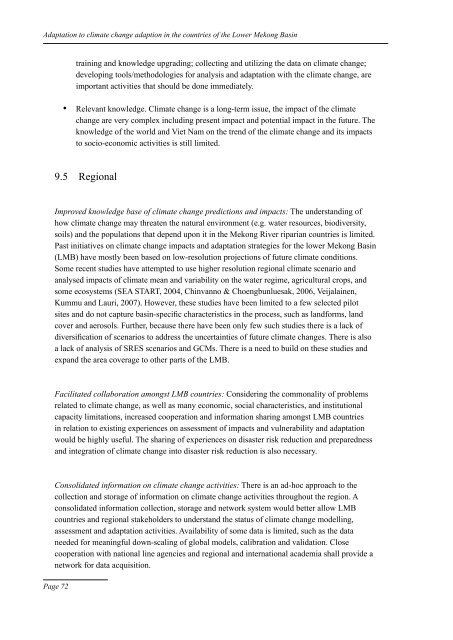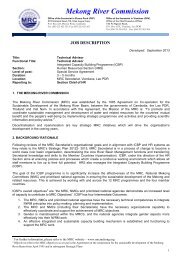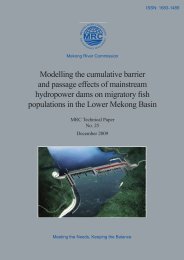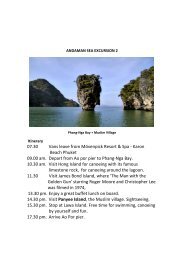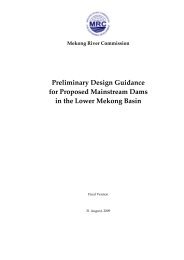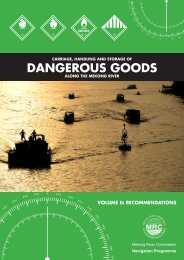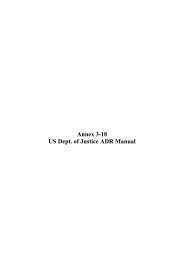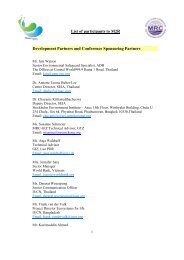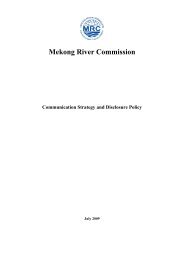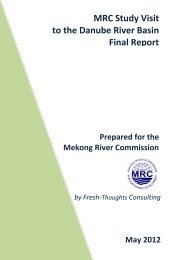Adaptation to climate change in the countries of - Mekong River ...
Adaptation to climate change in the countries of - Mekong River ...
Adaptation to climate change in the countries of - Mekong River ...
Create successful ePaper yourself
Turn your PDF publications into a flip-book with our unique Google optimized e-Paper software.
<strong>Adaptation</strong> <strong>to</strong> <strong>climate</strong> <strong>change</strong> adaption <strong>in</strong> <strong>the</strong> <strong>countries</strong> <strong>of</strong> <strong>the</strong> Lower <strong>Mekong</strong> Bas<strong>in</strong><br />
Page 72<br />
tra<strong>in</strong><strong>in</strong>g and knowledge upgrad<strong>in</strong>g; collect<strong>in</strong>g and utiliz<strong>in</strong>g <strong>the</strong> data on <strong>climate</strong> <strong>change</strong>;<br />
develop<strong>in</strong>g <strong>to</strong>ols/methodologies for analysis and adaptation with <strong>the</strong> <strong>climate</strong> <strong>change</strong>, are<br />
important activities that should be done immediately.<br />
• Relevant knowledge. Climate <strong>change</strong> is a long-term issue, <strong>the</strong> impact <strong>of</strong> <strong>the</strong> <strong>climate</strong><br />
<strong>change</strong> are very complex <strong>in</strong>clud<strong>in</strong>g present impact and potential impact <strong>in</strong> <strong>the</strong> future. The<br />
knowledge <strong>of</strong> <strong>the</strong> world and Viet Nam on <strong>the</strong> trend <strong>of</strong> <strong>the</strong> <strong>climate</strong> <strong>change</strong> and its impacts<br />
<strong>to</strong> socio-economic activities is still limited.<br />
9.5 Regional<br />
Improved knowledge base <strong>of</strong> <strong>climate</strong> <strong>change</strong> predictions and impacts: The understand<strong>in</strong>g <strong>of</strong><br />
how <strong>climate</strong> <strong>change</strong> may threaten <strong>the</strong> natural environment (e.g. water resources, biodiversity,<br />
soils) and <strong>the</strong> populations that depend upon it <strong>in</strong> <strong>the</strong> <strong>Mekong</strong> <strong>River</strong> riparian <strong>countries</strong> is limited.<br />
Past <strong>in</strong>itiatives on <strong>climate</strong> <strong>change</strong> impacts and adaptation strategies for <strong>the</strong> lower <strong>Mekong</strong> Bas<strong>in</strong><br />
(LMB) have mostly been based on low-resolution projections <strong>of</strong> future <strong>climate</strong> conditions.<br />
Some recent studies have attempted <strong>to</strong> use higher resolution regional <strong>climate</strong> scenario and<br />
analysed impacts <strong>of</strong> <strong>climate</strong> mean and variability on <strong>the</strong> water regime, agricultural crops, and<br />
some ecosystems (SEA START, 2004, Ch<strong>in</strong>vanno & Choengbunluesak, 2006, Veijala<strong>in</strong>en,<br />
Kummu and Lauri, 2007). However, <strong>the</strong>se studies have been limited <strong>to</strong> a few selected pilot<br />
sites and do not capture bas<strong>in</strong>-specific characteristics <strong>in</strong> <strong>the</strong> process, such as landforms, land<br />
cover and aerosols. Fur<strong>the</strong>r, because <strong>the</strong>re have been only few such studies <strong>the</strong>re is a lack <strong>of</strong><br />
diversification <strong>of</strong> scenarios <strong>to</strong> address <strong>the</strong> uncerta<strong>in</strong>ties <strong>of</strong> future <strong>climate</strong> <strong>change</strong>s. There is also<br />
a lack <strong>of</strong> analysis <strong>of</strong> SRES scenarios and GCMs. There is a need <strong>to</strong> build on <strong>the</strong>se studies and<br />
expand <strong>the</strong> area coverage <strong>to</strong> o<strong>the</strong>r parts <strong>of</strong> <strong>the</strong> LMB.<br />
Facilitated collaboration amongst LMB <strong>countries</strong>: Consider<strong>in</strong>g <strong>the</strong> commonality <strong>of</strong> problems<br />
related <strong>to</strong> <strong>climate</strong> <strong>change</strong>, as well as many economic, social characteristics, and <strong>in</strong>stitutional<br />
capacity limitations, <strong>in</strong>creased cooperation and <strong>in</strong>formation shar<strong>in</strong>g amongst LMB <strong>countries</strong><br />
<strong>in</strong> relation <strong>to</strong> exist<strong>in</strong>g experiences on assessment <strong>of</strong> impacts and vulnerability and adaptation<br />
would be highly useful. The shar<strong>in</strong>g <strong>of</strong> experiences on disaster risk reduction and preparedness<br />
and <strong>in</strong>tegration <strong>of</strong> <strong>climate</strong> <strong>change</strong> <strong>in</strong><strong>to</strong> disaster risk reduction is also necessary.<br />
Consolidated <strong>in</strong>formation on <strong>climate</strong> <strong>change</strong> activities: There is an ad-hoc approach <strong>to</strong> <strong>the</strong><br />
collection and s<strong>to</strong>rage <strong>of</strong> <strong>in</strong>formation on <strong>climate</strong> <strong>change</strong> activities throughout <strong>the</strong> region. A<br />
consolidated <strong>in</strong>formation collection, s<strong>to</strong>rage and network system would better allow LMB<br />
<strong>countries</strong> and regional stakeholders <strong>to</strong> understand <strong>the</strong> status <strong>of</strong> <strong>climate</strong> <strong>change</strong> modell<strong>in</strong>g,<br />
assessment and adaptation activities. Availability <strong>of</strong> some data is limited, such as <strong>the</strong> data<br />
needed for mean<strong>in</strong>gful down-scal<strong>in</strong>g <strong>of</strong> global models, calibration and validation. Close<br />
cooperation with national l<strong>in</strong>e agencies and regional and <strong>in</strong>ternational academia shall provide a<br />
network for data acquisition.


